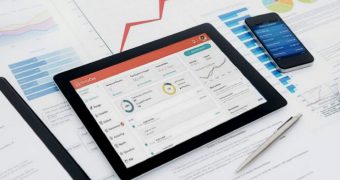Still Using QuickBooks for Rental Properties?

QuickBooks® is one of the most popular entry level accounting software solutions, a much appreciated step up from spreadsheets. Yet for landlords and property managers growing beyond 50 properties, another big step up is required.
Below you’ll find 10 important issues with QuickBooks to consider as you look ahead to upgrading to an appropriate property management accounting solution.
Are QuickBook’s Performance Issues beginning to Cost You?
Many products are promoted as a Swiss Army knife for use by all businesses. Yet every industry has its specialized requirements and regulations which must be fulfilled.
Industry-specialized software solutions are built for higher performance along with ease of use for intended users. Getting beyond QuickBooks® and spreadsheets, with its performance bottlenecks, limitations, and manual accounting data re-entry is going to increase efficiency which will boost your bottom line.
Property management is a special, complex business so having a trained, knowledgeable customer service expert to contact is often as important as the software itself. And integration of accounting into your full property management platform makes work much easier too.
A User Friendly, Complete, Powerful Accounting Platform
Powerful accounting features, great customer service, a great price and reliable performance are a joy to ManageCasa customers. See the Quickbooks vs ManageCasa comparison.
10 Major Deficiencies and Drawbacks with Quickbooks®
- Limited functionality: QuickBooks® was initially designed for small businesses rather than larger operations such as within property management companies. It lacks many features to streamline accounting processes specifically related to the industry such as rent collection, maintenance tracking, and keeping accounts separate. Automation of functions will be limited.
- Multi-Account management: QuickBooks® can’t manage the multi-account system which larger property management companies need to track expenses, and separate payments to owners, security deposits and other items from all other financials.
- Unwise workarounds: To make Quickbooks® work for property managers, a lot of difficult workarounds are needed (such as adding both properties and tenants as customers). Each workaround potentially creates new issues or errors.
- Limited performance for growing businesses: QuickBooks® slows when handling large transaction volumes or when several users are working in the software at the same time. After reaching a certain limit, users may see slower performance and random crashes, making this a troublesome issue for a growing property management businesses.
- Manual data entry: Property management staff must frequently re-enter data from one system to another – leading to errors and wasted time and effort. Integration and automation remove errors and streamlines entries which reduces staff workloads.
- Limited financial visibility: to make accurate and timely business decisions, it’s important to have real-time views of your financial data. QuickBooks® doesn’t have real time dashboards, instead only templated reports. This forces managers to make key decisions using outdated data.
- Integration issues: QuickBooks® has limited compatibility with third party applications which may hinder your ability to sync data from other important management tools that run your operation such as rent payment processors, tenant bank account integration, lease management, maintenance tickets, HOA violation fines, and more.
- Lack of support: QuickBooks® customer support is more for general small business and lacks the specialized customer support for Property Management Companies.
- Lack of automation: QuickBooks® does not automate processes such as rent collection, late fees, accounting transactions, and maintenance requests. This lack of automation increases workloads for staff and can result in delays and errors.
- Scalability: QuickBooks® may not be scalable for property managers who are managing a large number of properties. As the number of properties grows, the software may become slow and less efficient.
When first starting out in the rental business, landlords often use one of the low cost bookkeeping software products without the limitations affecting them much. QuickBooks® or other products work for a limited number of rental properties. But when properties and renters climb in number, a more rugged solution designed for property management is needed.
Simplicity is Built In
Accounting Integration and Payment Automation is So Sweet!
There comes a time when every landlord and property management company manager makes the decision to upgrade to a full fledged, online property management platform.
The services integration and accounting automation features of ManageCasa highlights why a dedicated accounting software is necessary. If this is that moment for you, take a closer look at ManageCasa’s full feature set.
For a very affordable price, ManageCasa delivers significant value across your business.
View ManageCasa’s Solution Now
Our Next Conference in Las Vegas: The NMHC OPTECH | OPTECH Conference Las Vegas | Your Trip to Vegas
Property Accounting & Reporting Solution | Property Management Guide | Real Estate Accounting Software | HOA Accounting Software | Real Estate Management | Real Estate Accounting Software | Buildium Survey | Easy to Learn Property Accounting | Rent Collection | Customizable Accounting Software | SaaS and Accounting | Improve Property Accounting | Income Statements for Rentals | Property Management Financial Reports | QuickBooks vs ManageCasa | Software for Property Management









